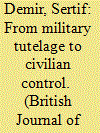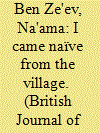|
|
|
Sort Order |
|
|
|
Items / Page
|
|
|
|
|
|
|
| Srl | Item |
| 1 |
ID:
173350


|
|
|
|
|
| Summary/Abstract |
Since America’s invasion of Iraq in 2003 and the consequent partial collapse of the state Iraq has been undergoing a process of deterioration and disintegration mainly because America’s vision of establishing a new, more democratic political order there encountered a lack of readiness to understand what the structure of a democratic state should be. The political process that Iraq has been going through – that is the transition from autocratic dictatorship to adopting a kind of democratic system is called anocracy, which means a political system that is neither fully democratic nor fully autocratic.
|
|
|
|
|
|
|
|
|
|
|
|
|
|
|
|
| 2 |
ID:
173353


|
|
|
|
|
| Summary/Abstract |
This study examines the prospects of public deliberation in a semi-authoritarian political context and unfavourable political cultural setting through an in-depth analysis of three public forums taking place in the aftermath of the 2013 Gezi Protests. This analysis shows that while the gains of deliberation in terms of influencing policy decision-making are limited, significant gains can still be reached in terms of creating a more civic public and a more strongly connected civil society that keeps its linkages with social movements. The study also finds that such forums can help create dialogue among distant segments of the society even though such interactions are still rather modest. These findings have implications for public deliberation in other non-deliberative settings as they open new areas of research in terms of the prospects of such forums in increasing social capital, pluralism and civicness.
|
|
|
|
|
|
|
|
|
|
|
|
|
|
|
|
| 3 |
ID:
173349


|
|
|
|
|
| Summary/Abstract |
The Turkish Armed Forces (TAF) have been the main discussion topic in the political arena over the last decade in Turkey, with a focus on curtailing military supervision over political life. This article investigates the evolution of civil–military relations (CMR) in Turkey. Thus, the aim of this study is to explore the factors and dynamics that have led to the development and realignment of CMR in Turkey. The focus will be on how military tutelage in Turkey has been ended, what factors have caused this and finally whether Turkish CMR have been normalized.
|
|
|
|
|
|
|
|
|
|
|
|
|
|
|
|
| 4 |
ID:
173356


|
|
|
|
|
| Summary/Abstract |
This article examines the formative years of the first television station in the Middle East and the Arab World: Baghdad Television. The Hashemite Monarchy recognized television’s potential as an effective tool of reconciliation with an increasingly disenchanted population and a means for homogenization and knowledge production. However, the professionals responsible for maintaining television came from social and economic backgrounds that suffered under or did not benefit directly from the Hashemites and their stakeholders. This specialized cadre opposed the undemocratic features of the government as evidenced in the content they created, produced, directed, or performed on Baghdad Television. Television specialists had their own vision of what the future of Iraq should look like. Their expectations manifested in a sociocultural attunement process facilitated through television wherein aired content, explicitly or tacitly, contradicted government messages and highlighted deeply rooted economic, political, and social problems in Iraq. This article relies on archival research, statistical reports, interviews, memoirs, televised performances, news segments, radio broadcasts, and newspapers to trace the history of Baghdad Television during Monarchic Iraq.
|
|
|
|
|
|
|
|
|
|
|
|
|
|
|
|
| 5 |
ID:
173355


|
|
|
|
|
| Summary/Abstract |
During the Mandate period (1920–1948), Haifa attracted thousands of Palestinian rural migrants, who constituted a significant portion of its Arab population. The article examines the experience of rural migrants in urban life and the influence of this social group on urban society. I argue that rural migrants contributed to Haifa’s economic development, participated in political and cultural activity and formed a connecting link between the city and their villages of origin. Rural migrants played a significant role as agents of change in Palestinian society, owing to the conjunction of rural and urban characteristics in their daily life. To demonstrate this, I focus on three arenas of their agency: the labour market, civil society and militias during the Arab Revolt. Their involvement in civil associations and in the Arab Revolt was central to their construction of modernity, and they disseminated it in widening circles in their villages of origin and among their acquaintances in the city.
|
|
|
|
|
|
|
|
|
|
|
|
|
|
|
|
| 6 |
ID:
173342


|
|
|
|
|
| Summary/Abstract |
Syrian refugees are causing upheavals in Jordan’s economy and education. Unemployment of Jordan’s native youth is 29.9% without the addition of unemployed refugees further threatening the stability of the country. The cost of educating, sheltering, feeding and integrating them into the cities with resulting school congestion creates resentment in citizens paying 60% of their national budget for refugees. To alleviate educational pressures alone, Jordan solicited funding from the European Union, United Kingdom, Germany, United States and Norway. Together, they pledged 81.5 million in May 2016 to expand education for Jordan’s refugee children. From the refugees’ perspective, all face similar challenges in gaining access to classrooms, adapting to the culture taught in the schools and catching up academically as they try to prepare for and seek employment to survive. Jordan’s government has implemented two 5-year educational reorganization programmes Educational Reform for Knowledge Economy (ERfKE) I, II that are in many cases unknowingly shifting instruction from idealism to pragmatism. This philosophical movement towards pragmatism is less expensive and more effective for future employment of all students in contrast to the existing idealistic system. Jordan’s transitioning changes in educational philosophies and programmes provide visions for Jordan’s future. Their educational adaptations provide suggestions for other refugee host countries.
|
|
|
|
|
|
|
|
|
|
|
|
|
|
|
|
| 7 |
ID:
173351


|
|
|
|
|
| Summary/Abstract |
In 2017, following a fraught 22-year struggle, Israel appointed the first female judge (sing. qadiya, pl. qadiyat) to its Islamic (shari’a) courts. This contrasts with the earlier appointments of qadiyat around the world, most notably in the Palestinian Authority in 2009. The Israeli shari’a courts’ jurisdiction over family law, a field of law which engages in women’s issues, makes the introduction of qadiyat particularly salient. This article is among the first to focus academic research on the issue of qadiyat within Israel and is based on field interviews with practitioners and academic experts, as well as documentary primary and secondary sources. This article finds that the obstacles that delayed the appointment of Israel’s first qadiya were a manifestation of the political impact Muslim minority status had on the country’s Muslim and Jewish establishments.
|
|
|
|
|
|
|
|
|
|
|
|
|
|
|
|
| 8 |
ID:
173357


|
|
|
|
|
| Summary/Abstract |
This paper examines the petitions of a poor woman, Jalila Saʿd, who sought educational opportunities and property from the Egyptian government between 1908 and 1913. Her interest in procuring a ‘place’ for her sons and her family in modernizing Egypt reflects the ways in which non-elites were able to participate in and move within the major physical and discursive public spaces of the era. This study argues that even those at the very edges of society were not categorically marginalized; rather, they were negotiating the dominant spatial hierarchies of their time in attempts to better their circumstances. This ability to navigate and participate in the prevailing discussions and institutions of the time demonstrates that even the most marginalized elements of Egyptian society were quite integrated into the project of ‘modern Egypt’, even if they did not always reap its benefits.
|
|
|
|
|
|
|
|
|
|
|
|
|
|
|
|
| 9 |
ID:
173354


|
|
|
|
|
| Summary/Abstract |
This paper examines the formation of authoritarian populism in Turkey by analysing mass mobilization and its repercussions in the symbolic and imaginary realms as authoritarian right-wing populisms have gained global popularity. It scrutinises the AKP government’s mobilization of the masses in the so-called ‘democracy watches’ after the coup attempt on 15 July 2016. During the demonstrations that took place in various locations in Istanbul, authors carried out participant observation fieldwork and field interviews. The paper concludes that democracy watches constitute a significant means of constructing and consolidating a new authoritarian regime, thereby endowing this consolidation process with a popular legitimacy.
|
|
|
|
|
|
|
|
|
|
|
|
|
|
|
|
| 10 |
ID:
173358


|
|
|
|
|
| Summary/Abstract |
Questions of media form have not received sufficient attention in recent studies of Arabic-language media. In Jordanian radio today, however, media form is a highly relevant discursive resource for broadcasters, who strategically invoke the ways in which different types of media communication are conceived and framed, in a metapragmatic manner that goes beyond the impact of merely technical distinctions between media forms. This article examines two examples of this process: the ‘unification’ of radio station voices in a memorial programme for a martyred fighter pilot broadcast in February 2015, where radio’s limitation to sound was used ideologically to assert national unity; and references to digital media on morning talk show programmes, which allow hosts to define audiences and forms of participation in radio conversations. These metapragmatic framings of media form, further, produce specific publics for Jordanian radio: groupings that include, and legitimize, certain segments of listenership—such as ‘true’ Jordanians or ‘the Jordanian people’—while implicitly excluding others. Grounded firmly in discursive data, this article thus provides much-needed nuance to our understanding of mass media in the Arabic-speaking Middle East today—and, ultimately, the genuine significance of media form in its social and cultural context.
|
|
|
|
|
|
|
|
|
|
|
|
|
|
|
|
|
|
|
|
|